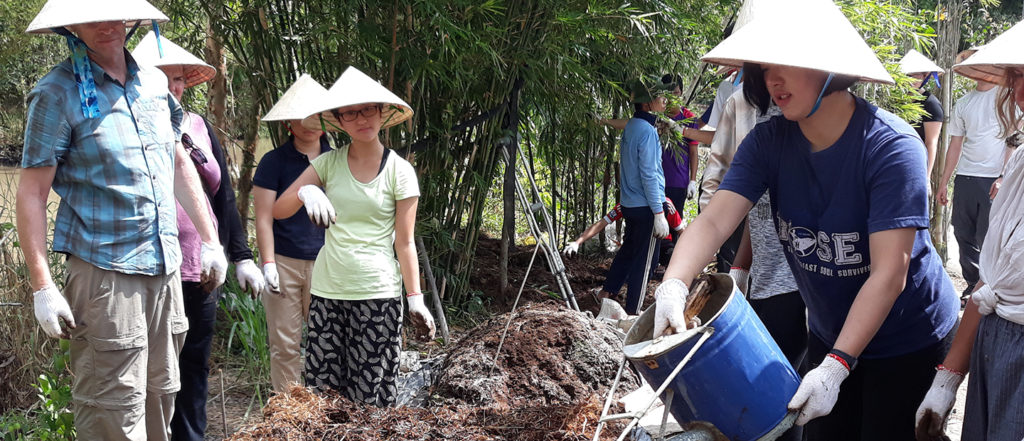Yale-NUS faculty and students participate in EnviroLab Asia to bring positive changes to the environment

EnviroLab Asia is an environmental laboratory for cross-disciplinary research and experiential learning that links knowledge with practice. It aims to train students, faculty and staff to become active practitioners of change who develop sustainable and socially just policy-relevant solutions to environmental challenges in Asia, with a focus on East and Southeast Asia (SEA). Yale-NUS College is one of the partners for this initiative led by the Claremont Colleges, a consortium of five undergraduate liberal arts colleges in the US. The environmental laboratory was first established in 2015 with a grant from The Henry Luce Foundation’s Luce Initiative on Asian Studies and the Environment (LIASE).
Speaking on the partnership between Yale-NUS College and the Claremont Colleges, Professor of Science Brian G McAdoo explained, “The Henry Luce Foundation has been supporting liberal arts colleges’ introduction and exploration of Asia for many years now. One of our former colleagues, Professor Bryan Penprase, was a faculty member at Pomona College (one of the colleges in the Claremont Consortium) and was aware that they were seeking local partners for the initiative. The Environmental Studies programme at Yale-NUS is intimately involved with many of the acute issues that surround us and often affect our daily lives, so we are a natural partner. Having ‘boots on the ground’ is extremely helpful when it comes to environmental issues as well as contacts in the areas that we would want to visit.”
As a research laboratory for liberal arts colleges, one of EnviroLab Asia’s hallmarks is its robust integrated and discipline-spanning approach to solving environmental issues in Asia. By exposing students to methodologies from the natural and social sciences and humanities, the programme seeks to empower students to study environmental issues through cross-disciplinary lens.
“The EnviroLab Asia programme is extremely interdisciplinary. The Principle Investigators of the grant are Associate Professor Albert Park, who specialises in History at Claremont McKenna College, Associate Professor Marc Los Huertos, Aquatic Chemistry in Pomona College, and Associate Professor Branwen Williams, Marine Environmental Change in the Keck Science Department of Claremont McKenna, Pitzer and Scripps Colleges. Various other participants like Anne Harley who researches Music, Lisa Auerbach in Art and Zayn Kassam in Religion round up the team,” shared Professor McAdoo on the diverse specialisations of the various faculty and staff of EnviroLab Asia.
Over the next four years, EnviroLab Asia will focus on “Environmental Infrastructures in Asia: Nature, Networks, and People in the Anthropocene” and will feature four annual clinic trips to various destinations in Asia. The first one – to Thailand and Vietnam – took place in January 2018. The trip focused on infrastructure and power, trans-boundaries and governance, agency and built environment as well as performance art and resilience.
“In Vietnam, students explored organic farming from a policy perspective. In Chanthaburi, Thailand, they learned about the effectiveness of mangroves as an filter effluent from shrimp farms and also created a musical/theatre piece with colleagues from the Burapha University Music and Performing Arts department, the Burapha Marine Technology group and even the local workers of the shrimp farms,” added Professor McAdoo.
For many of the participants, the chances to interact with a range of stakeholders in the local sites, such as local scholars and students, Non-Governmental Organisations (NGOs), businesses and artists, cemented the experiential learning of the programme and impacted them immensely.
Samen Yasar (Class of 2021) who hails from Bangladesh, is one of the participants. “My greatest takeaway from the trip was the realisation of the massive similarities between the Vietnamese culture and Bangladeshi culture. The socio-cultural and environmental problems that the average Vietnamese people face are very similar to what Bangladeshis face too. I believe more intercultural engagement between the people of the two countries would help us a lot in our common goal of dealing with problems like climate change, sea level rise, salinity intrusion, overpopulation, mangrove destruction and etc.”
Another participant of the trip, Regina Veronica Vanda (Class of 2021) shared, “Nature and culture develop in an intricately interdependent manner. When chemical warfare was used in the Vietnam war and mangrove forests were destroyed, the livelihood of people was not spared. When mangroves are destroyed, food security will be challenged and the poorest made vulnerable. Nonetheless, in this trip I have witnessed the coming together of the community to restore mangrove forests, and thus, visible and rapid recovery to bolster the resilience of the community to environmental and social hazards is evident. Simultaneously, environmental consciousness is growing among Vietnamese, especially those whose lives are directly affected by environmental changes in the rural areas.”
In addition to learning about environmental issues, the communication opportunities she had with the stakeholders also reinforced Regina’s personal interest in environmental communication. “I am interested in environmental communication through photojournalism. I have a website called Lens On in which I curate photos and write articles about diverse ideas for sustainable development in Singapore and the region. The experience of speaking to locals and learning critically about their initiatives has also helped me hone my ethnographic skills which is crucial to effective environmental communication.”
The next three clinic trips will be to Japan in 2019, Korea in 2020 and China in 2021. Each of the Envirolab Asia trips and associated research will be conducted in close cooperation with Yale-NUS, local universities and organisations, as participants explore themes ranging from the intersection of nature, nuclear history and infrastructure to contested infrastructure and ecological development, agriculture and more.





